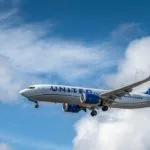
(NEW YORK) — Airlines have canceled more than 5,200 flights since Saturday in the U.S. and United Airlines CEO claimed the Federal Aviation Administration staffing and inexperience is partly to blame.
United CEO Scott Kirby sent a letter to United employees on Monday, blaming the FAA for travel disruptions this past weekend at Newark Airport, one of United’s busiest hubs and in the center of the nation’s most congested air corridor.
“As you know, the weather we saw in EWR is something that the FAA has historically been able to manage without a severe impact on our operation and customers. This past Saturday, however, was different,” Kirby said in an internal memo to employees Monday.
Following bad weather, United canceled 293 flights at Newark and delayed 251 on Monday alone. As of 12:40 ET Tuesday, United canceled 251 flights and delayed 125 others.
“The FAA reduced the arrival rates by 40% and the departure rates by 75%. That is almost certainly a reflection of understaffing/lower experience at the FAA. It led to massive delays, cancellations, diversions, as well as crews and aircraft out of position,” Kirby wrote. “And that put everyone behind the eight ball when weather actually did hit on Sunday and was further compounded by FAA staffing shortages Sunday evening.”
The FAA responded in a statement, saying, “We will always collaborate with anyone seriously willing to join us to solve a problem.”
The series of cancellations started Sunday with weather on the East Coast and an FAA computer failure at a control center outside Washington, D.C.
The FAA said it “paused” departures to Washington, D.C., airports Sunday due to “repairs” being made to a communications system at an air traffic control facility in the region. The pause impacted flights across the Northeast, contributing along with weather to almost 10,000 flights delayed and 1,400 canceled across the US Sunday.
United’s public airing of grievances against the FAA is the latest in a long series of clashes between the airline and the agency.
In a company earnings call this year, Kirby told analysts, “All companies, including airlines and the FAA, need to staff at higher levels.”
In September last year, Kirby said at a conference in Washington, D.C., the FAA was “by far the No. 1” cause of flight delays. Hours later, the FAA released data showing that airlines were the No. 1 cause.
The latest spat also comes just after DOT’s Office of Inspector General found the FAA continues to face staffing shortages for air traffic controllers, and has made “limited efforts” to ensure adequate staffing at critical ATC facilities.
The OIG’s report found that 20 of 26 critical ATC facilities are staffed below the FAA’s 85% threshold. The FAA’s Certified-Professional-Controller workforce has decreased by 10% over the last decade, the audit found.
The problem was exacerbated by the pandemic, the audit found, when training was paused for nearly two years.
Throughout its probe, officials interviewed managers at various ATC facilities who said their towers were not adequately staffed, and that controllers were working mandatory overtime and 6-day work weeks to cover the shortages.
The FAA said in response to the report it recently completed a comprehensive review of the distribution of its controllers and submitted a Controller Workforce Plan to Congress in May.
Additionally, the agency said it’s implementing the Air Traffic Operations Management System — a comprehensive system that will track controller timekeeping and various work assignments.
Copyright © 2023, ABC Audio. All rights reserved.
